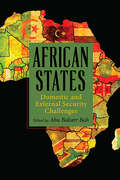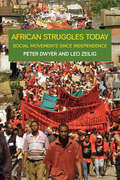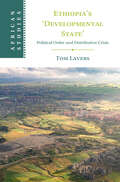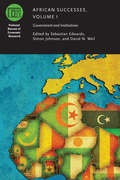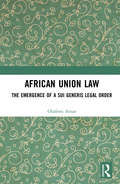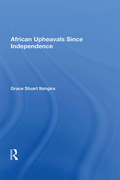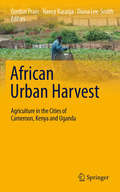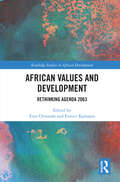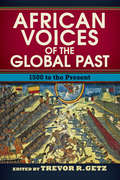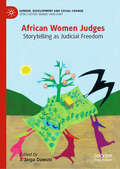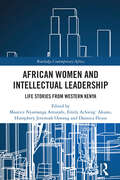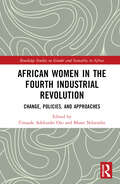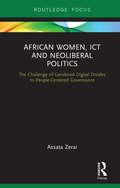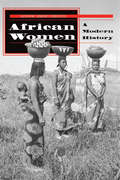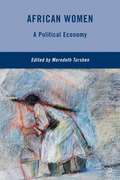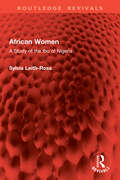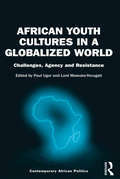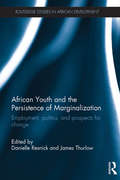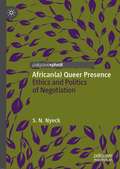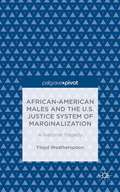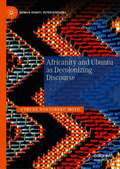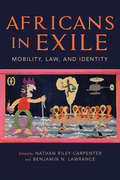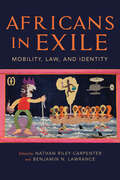- Table View
- List View
African States: Domestic and External Security Challenges (SUNY series, James N. Rosenau series in Global Politics)
by Abu Bakarr BahEssays on the security challenges faced by African states.The central concern that shapes this edited volume is the nature of the African state. Contributors point to an interesting intersection of domestic and external issues that is framed as a glocalized security situation. Individual chapters shed new insights on conflict drivers through case studies on Sierra Leone, Cameroon, Mali, Nigeria, and Somalia, as well as broader issues on the nature of African states. Arguments pivot on three issues, which show the intersection of the domestic and external forces that render the African state as a glocal problem: (a) the colonial roots of the state, (b) problems of governance, and (c) international and regional security imperatives. By problematizing the African state and connecting the security challenges of African states to colonialism, patrimonial rule, and geopolitical security issues, African States brings forth a new way of examining African states through the notion of glocalized security.
African Struggles Today
by Peter Dwyer Leo ZeiligThree leading Africa scholars investigate the social forces driving the democratic transformation of postcolonial states across southern Africa. Extensive research and interviews with civil society organizers in Zimbabwe, South Africa, Zambia, Malawi, Namibia, and Swaziland inform this analysis of the challenges faced by non-governmental organizations in relating both to the attendant inequality of globalization and to grassroots struggles for social justice.Peter Dwyer is a tutor in economics at Ruskin College in Oxford.Leo Zeilig Lecturer at the Institute of Commonwealth Studies, University of London.
African Studies Series: Political Order And Distributive Crisis (African Studies #Series Number 168)
by Tom LaversAfrican Studies: Political Identity and Conflict in Central Angola, 1975–2002
by Justin PearceThis book examines the internal politics of the war that divided Angola for more than a quarter-century after its independence. It emphasises the Angolan people's relationship to the rival political forces that prevented the development of a united nation, an aspect of the conflict that has received little attention in earlier studies. Drawing upon interviews with farmers, town dwellers, soldiers and politicians in Central Angola, Justin Pearce examines the ideologies about nation and state that elites deployed in pursuit of hegemony and traces how people responded to these attempts at politicisation. The book not only demonstrates the potency of the rival conceptions of state and nation in shaping perceptions of self-interest and determining political loyalty, but also shows the ways in which allegiances could and did change for much of the Angolan population in response to the experience of military force.
African Studies: Political Thought and the Public Sphere in Tanzania
by Emma HunterPolitical Thought and the Public Sphere in Tanzania is a study of the interplay of vernacular and global languages of politics in the era of decolonization in Africa. Decolonization is often understood as a moment when Western forms of political order were imposed on non-Western societies, but this book draws attention instead to debates over universal questions about the nature of politics, concept of freedom and the meaning of citizenship. These debates generated political narratives that were formed in dialogue with both global discourses and local political arguments. The United Nations Trusteeship Territory of Tanganyika, now mainland Tanzania, serves as a compelling example of these processes. Starting in 1945 and culminating with the Arusha Declaration of 1967, Emma Hunter explores political argument in Tanzania's public sphere to show how political narratives succeeded when they managed to combine promises of freedom with new forms of belonging at local and national level.
African Successes, Volume I: Government and Institutions
by Simon Johnson Sebastian Edwards David N. WeilStudies of African economic development frequently focus on the daunting challenges the continent faces. From recurrent crises to ethnic conflicts and long-standing corruption, a raft of deep-rooted problems has led many to regard the continent as facing many hurdles to raise living standards. Yet Africa has made considerable progress in the past decade, with a GDP growth rate exceeding five percent in some regions. The African Successes series looks at recent improvements in living standards and other measures of development in many African countries with an eye toward identifying what shaped them and the extent to which lessons learned are transferable and can guide policy in other nations and at the international level. The first volume in the series, African Successes: Governments and Institutions considers the role governments and institutions have played in recent developments and identifies the factors that enable economists to predict the way institutions will function.
African Union Law: The Emergence of a Sui Generis Legal Order
by Olufemi AmaoThis book explores the emergence of African Union (AU) law as a legal order and its implications for existing order in the region. As an authoritative text on the development of AU law, the book covers such pertinent issues as legislative powers, competences, direct effect in AU law, subsidiarity, interventionism, and enforcement of laws. Olufemi Amao argues that there is a gradual movement from intergovernmentalism to supranationalism in the African Union legal order, and explores how this trajectory gradually and incrementally de-emphasises the discourse on nation state sovereignty; a concept that has caused many problems in the African context. Drawing upon EU law as a comparison, the book also examines how the development of supranationalism affects crucial issues such as human rights, democratic reforms, territorial matters, tribal and religious disputes, and economic relations. As a comprehensive examination of the development of law within a union, this book will be of great interest and use to students, scholars and practitioners in international law, international relations, and African studies.
African Upheavals Since Independence
by Grace Stuart IbingiraGrace Ibingira seeks the fundamental causes of the widespread upheavals (at least thirty-eight army coups in the past fifteen years) in African states today and finds them in the inadequate colonial preparation of African leaders for the responsibilities of independence, the earlier practices of "divide and raie, and the "winner-take-all policies o
African Urban Harvest: Agriculture in the Cities of Cameroon, Kenya and Uganda
by Gordon Prain Nancy Karanja Diana Lee-SmithOver the past two decades, how has urban agriculture changed in sub-Saharan Africa? Is city farming now better integrated into environmental management and city governance? And, looking ahead, how might urban agriculture address the needs of the low-income households and modernizing cities of Africa? In this book, leading specialists in the fields of urban agriculture and urban environment present a unique collection of case studies that examines the growing role of local food production in urban livelihoods in sub-Saharan Africa. Amongst many issues, the authors probe the changing role of urban agriculture, the risks and benefits of crop-livestock systems, and the opportunities for making locally produced food more easily available and more profitable. Concluding chapters reflect on the policy and governance implications of greater integration of urban natural resources and the built environment, an expanded role for urban agriculture in sub-Saharan Africa and the crucial role of women in urban food systems. African Urban Harvest will be of interest to decision-makers, development professionals, researchers, academics, and students and educators in urban planning, development studies, African studies, and environmental studies.
African Values and Development: Rethinking Agenda 2063 (Routledge Studies in African Development)
by Ezra Chitando Eunice KamaaraThis book considers the importance of African values, not only in catalysing development, but in sustaining it. Arguing for an urgent need for rapprochement between African politicians and intellectuals, the book discusses how African values and identities can contribute to the successful realization of initiatives such as the African Union’s Agenda 2063 and the United Nation’s Sustainable Development Goals (SDGs). Over the course of the book, the authors consider key themes such as identity, indigenous and modern worldviews; personhood; individual and communal perspectives; peace and conflict; and well-being. The book explores the role of religion and moral values, as well as African worldviews such as Ubuntu. Overall, the book demonstrates that African values will be central to galvanising Africa’s post-colonial transformation. This book will be an important read for policymakers and for researchers working on African development, politics, sociology, religion and philosophy.
African Voices of the Global Past: 1500 to the Present
by Trevor R. GetzGlobal historical events are too often recounted exclusively through European and American voices. African Voices of the Global Past explores six major historical developments of global significance?the Atlantic slave trade, industrialization, colonialism, the World Wars, decolonization, and the development of modern feminism?from an African perspective. Voices emerge throughout the text in the form of primary sources that explore the personal accounts of individuals. These enable students to look beyond the indistinct figures of Africans in European and American accounts to see the people directly involved and affected by the major global changes they experienced. Featuring contributed chapters from renowned scholars, many from the continent of Africa or the African diaspora, African Voices of the Global Past offers a unique view of global history from a traditionally overlooked perspective. This book is a perfect supplement for world history and African history instructors seeking to relate a compelling narrative of major world events.
African Women Judges: Storytelling as Judicial Freedom (Gender, Development and Social Change)
by J. Jarpa DawuniThis edited volume centers the voices of African women judges as agents of justice and equality. The legal and personal narratives approach in the book privileges the contributors’ lived experiences, professional trajectories, contributions and challenges. The legal narrative storytelling approach also contributes to oral histories of African indigenous knowledge production and transfer. By highlighting the substantive representation of women in African judicial leadership, the chapters examine their impact on the development of jurisprudence, judicial administration, and contributions to the rule of law, access to justice, and women's rights in contemporary Africa. This book significantly contributes to the diversity of knowledge and representation in the global discourse on gender and judging, offering a novel contribution to the growing literature on African women judges.
African Women and Intellectual Leadership: Life Stories from Western Kenya (ISSN)
by Emily Achieng’ Akuno Maurice Nyamanga Amutabi Humphrey Jeremiah Ojwang Dannica FleussThis book highlights the pioneering roles of African women as leaders and role models in Kenya, providing examples taken from across education, health, business, and a range of other sectors. Drawing on authentic first-hand accounts and narratives from key women in leadership positions, and those who have lived with them, the book presents the life stories of women leaders over the last fifty years, aiming to preserve their contributions for posterity and to inspire young people with moral, ethical, and progressive role models. The book uses African knowledge production strategies that look at the human being holistically, in the prism of Ubuntu, in order to define leadership in Africa from an African perspective, one that celebrates the role of the mother figure and places women at the centre of African values and societal dynamics. This book will be of interest to researchers and students of African studies, gender studies, and Kenyan education and socio-political history.
African Women in the Fourth Industrial Revolution: Change, Policies, and Approaches (Routledge Studies on Gender and Sexuality in Africa)
by Tinuade Adekunbi Ojo and Bhaso NdzendzeThis book investigates how women in Africa are being impacted by the Fourth Industrial Revolution, which describes the twenty-first-century proliferation of mobile internet, machine learning and artificial intelligence.The move towards digitalization brings fundamental changes in the way people work, live and generally relate to each other. However, in many areas of Africa, women face digital inclusion challenges, and their lack of access to the internet limits their social, political and economic participation in globalization. This book considers the different policy approaches taken in African countries, and their preparedness for enabling women’s participation in the Fourth Industrial Revolution, across a range of sectors.By diiscussing key topics such as artificial intelligence, technological adaptation, drones, entrepreneurship, education and financial inclusion, the book identifies positive policy approaches to ensure equitable progress towards the fourth industrial revolution at all structural levels.Making a powerful case for the benefits of inclusive digital innovation, this book will be of interest to researchers of women and technology in Africa.
African Women, ICT and Neoliberal Politics: The Challenge of Gendered Digital Divides to People-Centered Governance (Routledge Studies on Gender and Sexuality in Africa)
by Assata ZeraiHow can we promote people-centered governance in Africa? Cell phones/ information and communications technology (ICT) are shown to be linked to neoliberal understandings of more democratic governance structures, defined by the Worldwide Governance Indicators as: the rule of law, corruption-control, regulation quality, government effectiveness, political stability/no violence, and voice and accountability. However, these indicators fall short: they do note emphasize gender equity or pro-poor policies. Writing from an African feminist scholar-activist perspective, Assata Zerai emphasizes the voices of women in two ways: (1) she examines how women's access to ICT makes a difference to the success of people-centered governance structures; and (2) she demonstrates how African women's scholarship, too often marginalized, must be used to expand and redefine the goals and indicators of democratice governance in African countries. Challenging the status quo that praises the contributions of cell phones to the diffusion of knowledge and resultant better governance in Africa, this book is an important read for scholars of politics and technology, gender and politics, and African Studies.
African Women: A Modern History
by Catherine Coquery-VidrovitchThis sweeping, innovative book is the first to reconstruct the full history of women in sub-Saharan Africa. Tracing the lot of African women from the eve of the colonial period to the present, Catherine Coquery-Vidrovitch sheds light on issues ranging from gender to economy, politics, society, and culture. With its breadth of coverage and clear analysis of complex questions, this book is destined to become a standard text for scholars and students alike. }Over the last century, the social and economic roles played by African women have evolved dramatically. Long confined to home and field, overlooked by their menfolk and missionaries alike, African women worked, thought, dreamed, and struggled. They migrated to the cities, invented new jobs, and activated the so-called informal economy to become Africas economic and social focal point. As a result, despite their lack of education and relatively low status, women are now Africas best hope for the future. This sweeping and innovative book is the first to reconstruct the full history of women in sub-Saharan Africa. Tracing the lot of African women from the eve of the colonial period to the present, Catherine Coquery-Vidrovitch explores the stages and forms of womens collective roles as well as their individual emancipation through revolts, urban migrations, economic impacts, social claims, political strength, and creativity. Comparing case studies drawn from throughout the region, she sheds light on issues ranging from gender to economy, politics, society, and culture. Utilizing an impressive array of sources, she highlights broad general patterns without overlooking crucial local variations. With its breadth of coverage and clear analysis of complex questions, this book is destined to become a standard text for scholars and students alike. }
African Women: A Political Economy
by Meredeth TurshenThis book will present three main themes of African women: African feminism, women and work, and women and politics, to inform readers of the current debates, to encourage new thinking on these issues, and to indicate areas for needed research.
African Women: A Study of the Ibo of Nigeria (Routledge Revivals)
by Sylvia Leith-RossFirst Published in 1939 and reissued with a new preface in 1965, African Women presents a study of the Ibo women of Nigeria. The originality of the book lies in the fact that practically all the information is obtained from women and that throughout, customs, laws, circumstances and happenings are described from the women's point of view.Divided into four major parts, the book discusses important themes like the Aba riots; linguistic description of Owerri province; missions and native organizations; woman in Nneato; woman in Nguru; woman in transition in Owerri Town; sophisticated women in Port Harcourt; education and other western developments; and the future of Ibo women. This is an important historical reference work for scholars and researchers of African Studies, African women, and women's studies.
African Youth Cultures in a Globalized World: Challenges, Agency and Resistance (Contemporary African Politics)
by Lord Mawuko-Yevugah Paul UgorAll over the world, there is growing concern about the ramifications of globalization, late-modernity and general global social and economic restructuring on the lives and futures of young people. Bringing together a wide body of research to reflect on youth responses to social change in Africa, this volume shows that while young people in the region face extraordinary social challenges in their everyday lives, they also continue to devise unique ways to reinvent their difficult circumstances and prosper in the midst of seismic global and local social changes. Contributors from Africa and around the world cover a wide range of topics on African youth cultures, exploring the lives of young people not necessarily as victims, but as active social players in the face of a shifting, late-modernist civilization. With empirical cases and varied theoretical approaches, the book offers a timely scholarly contribution to debates around globalization and its implications and impacts for Africa's youth.
African Youth and the Persistence of Marginalization: Employment, politics, and prospects for change (Routledge Studies in African Development)
by Danielle Resnick James ThurlowThe much heralded growth and transformation of many economies in sub-Saharan Africa over the last decade continues to receive prominent attention in academic scholarship and among policy practitioners. An apparent feature about this transformation, however, is that Africa’s youth appear to have been left out. This book critically examines the extent and consequences of the marginalization of African youth. It questions conventional wisdoms about data trends, aspirational goals, and common policy interventions surrounding Africa’s youth that have been variously propagated in both the development studies literature and in mainstream donor policy reports. The book explores macro trends from both a temporal and cross-regional perspective in order to highlight what is distinct about contemporary African youth and whether their prospects and behaviours do actually vary from their counterparts in other regions of the world or from previous generations of African youth. Such studies include cross-country analyses of youth employment patterns and modes of political participation, in-depth examination of the behaviours and aspirations of the urban youth, and critical reflections on the impact of rural employment initiatives, vocational education, and learnership programmes. The incorporation of multiple methods and disciplines, as well as its attention to policy issues, ensures that the book will be of great interest to graduate students, researchers, and professional researchers whose work lies at the intersection of African area studies and development studies as well as those focused on development economics, political science, and public policy and administration.
African(a) Queer Presence: Ethics and Politics of Negotiation
by S.N. NyeckTo achieve something by way of negation is not just to state a difference. It is to impose a certain kind of violence and domination on things so ordered around for the sake of epistemic, religious, or political expediency also. The notion of queerness presented in this book takes the view that the process of conceptualizing selves “out-of-order” is fundamentally anti-dialectical, negotiated, political and spiritual. Queerness negation manifested as a form of colonial and postcolonial epistemic and political violence defines reality as the clash of ideal and non-ideal categories. The demand to achieve something by way of negation that dialectics imposes on itself is costly because it treats negation as inevitable. From an anti-dialectical standpoint, analyses of the films Proteus and Karmen Geï deal with the processes of freeing queer selves from colonial and postcolonial negation. The book reflects on the conditions and possibilities of queerness affirmation as an ethics of presence grounded in the politics of negotiation following the proposition of nego-feminism and the practical humanism of Senghor to offer an ethical and embodied vision of an ecological depth of feeling and will as foundational to relational possibilities within the African(a) world.
African-American Males and the U.S. Justice System of Marginalization: A National Tragedy
by Floyd WeatherspoonThis book provides an overview of the economic and social status of African-American males in America which continues to deteriorate at an alarming rate.
Africanity and Ubuntu as Decolonizing Discourse (Human Rights Interventions)
by Otrude Nontobeko MoyoThis book explores and discusses emerging perspectives of Ubuntu from the vantage point of “ordinary” people and connects it to human rights and decolonizing discourses. It engages a decolonizing perspective in writing about Ubuntu as an indigenous concept. The fore grounding argument is that one’s positionality speaks to particular interests that may continue to sustain oppressions instead of confronting and dismantling them. Therefore, a decolonial approach to writing indigenous experiences begins with transparency about the researcher’s own positionality. The emerging perspectives of this volume are contextual, highlighting the need for a critical reading for emerging, transformative and alternative visions in human relations and social structures.
Africans in Exile: Mobility, Law, and Identity (Framing the Global)
by Nathan Riley Carpenter Benjamin N LawranceThe enforced removal of individuals has long been a political tool used by African states to create generations of asylum seekers, refugees, and fugitives. Historians often present such political exile as a potentially transformative experience for resilient individuals, but this reading singles the exile out as having an exceptional experience. This collection seeks to broaden that understanding within the global political landscape by considering the complexity of the experience of exile and the lasting effects it has had on African peoples. The works collected in this volume seek to recover the diversity of exile experiences across the continent. This corpus of testimonials and documents is presented as an "archive" that provides evidence of a larger, shared experience of persecution and violence. This consideration reads exiles from African colonies and nations as active participants within, rather than simply as victims of, the larger global diaspora. In this way, exile is understood as a way of asserting political dissidence and anti-imperial strategies. Broken into three distinct parts, the volume considers legal issues, geography as a strategy of anticolonial resistance, and memory and performative understandings of exile. The experiences of political exile are presented as fundamental to an understanding of colonial and postcolonial oppression and the history of state power in Africa.
Africans in Exile: Mobility, Law, and Identity (Framing the Global)
by Edited by Nathan Riley Carpenter and Benjamin N. Lawrance“This rich volume will interest scholars and students of Africa, the African diaspora, world history, legal history, and international affairs.” —Lorelle Semley, author of To Be Free and French: Citizenship in France’s Atlantic EmpireThe enforced removal of individuals has long been a political tool used by African states to create generations of asylum seekers, refugees, and fugitives. Historians often present such political exile as a potentially transformative experience for resilient individuals, but this reading singles the exile out as having an exceptional experience. This collection seeks to broaden that understanding within the global political landscape by considering the complexity of the experience of exile and the lasting effects it has had on African peoples.The works collected in this volume seek to recover the diversity of exile experiences across the continent. This corpus of testimonials and documents is presented as an “archive” that provides evidence of a larger, shared experience of persecution and violence. This consideration reads exiles from African colonies and nations as active participants within, rather than simply as victims of, the larger global diaspora. In this way, exile is understood as a way of asserting political dissidence and anti-imperial strategies.Broken into three distinct parts, the volume considers legal issues, geography as a strategy of anticolonial resistance, and memory and performative understandings of exile. The experiences of political exile are presented as fundamental to an understanding of colonial and postcolonial oppression and the history of state power in Africa.
